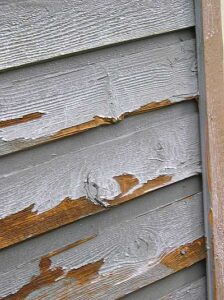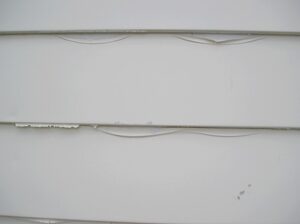Understanding the causes of exterior peeling paint will give you many more years before repainting. The main reason of peeling is water. If water vapor condenses underneath the primer or finish pressure will result causing the paint to lift from the surface and crack. This crack will be very small, but it will allow more water onto the surface and behind the finish. This process accelerates until you notice peeling paint.
A possible cause of water infiltration is inadequate or split caulking. Applying the best sealant and using proper caulking techniques can make or break any paint job.
An additional area of concern is water vapor in the exterior walls. This can be a major problem with older homes that don’t have plastic vapor barriers installed between the framing and drywall or plaster.
If excessive peeling is in the same area as a bathroom it is possible moisture from bathing or showers is entering the exterior wall and causing the peeling. The best solution for this problem is to install an exhaust fan and maintain a lower level of humidity.
Gutters and flashing can leak causing problems to occur on the fascia boards and soffit. Inserting 4-6 inch wide metal flashing under the first course of shingles will block the entry of water behind the fascia and onto the soffit.
An additional and common cause of peeling paint is applying paint to wood siding that should has been stained. Examples of wood siding types that shouldn’t be painted are T1-11 and rough cut cedar.
Both of these types of siding are very porous are prone to cracking. This will cause early peeling and they should be stained instead of painted.
Water Isn’t The Only Cause Of Exterior Peeling Paint
If an area has excessive moisture you will need to find its source and repair this problem before proceeding.
Another cause of peeling paint is an incompatibility between the layers or coats of paint. Latex or Acrylic finishes cannot be applied over oil base or Alkyd finishes without the use of an appropriate primer first.
Also oil base paints become very hard and brittle with age, while latex paints are flexible. As the sun heats a surface it will expand. Flexible finishes will stretch while brittle finishes will break or crack.
If Acrylic, or latex, paint is applied over many layers of Alkyd, or oil base, paint the flexible Acrylic can tear the old oil base paint off the surface, down to raw wood in some cases. The Alkyd paint can loose adhesion with the layers underneath or on top during this process.
Additional Causes
- The application of an interior paint to exterior surfaces.
- Paint that is applied in freezing weather.
- Surface contamination.
These are a few examples of peeling that can occur. Always inspect all areas of your home during the surface preparation process. It is necessary to remove all loose and peeling paint and repair all defects before applying any primer or paint.
About the Author:
Crowder Painting is your go-to for interior and exterior painting in Colorado Springs. Experience our commitment to precision and quality.


